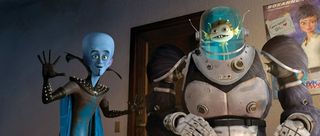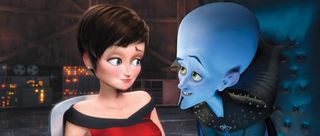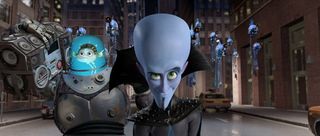Exclusive Interview: Megamind Director Tom McGrath

Nowadays it’s impossible to go a full year without seeing a comic book adaptation. In the next two years we will see Green Lantern, Thor, Captain America: The First Avenger, The Dark Knight Rises, the Superman reboot, Ghost Rider 2 and the Spider-Man reboot find their way into theaters (and that’s probably only a cross-section). The issue, however, is that many of the stories have overlapping elements, from daddy issues to a final battle that sees good triumph over evil. With Megamind, director Tom McGrath turns that idea on its ear.
Centered on the titled character, the film asks the question “What would happen if a supervillain managed to defeat and kill his nemesis?” Featuring the voice talents of Will Ferrell, Tina Fey, Brad Pitt and Jonah Hill, the film is a send-up of superhero tropes without being a direct parody, featuring elements that both comic fans and non-comic fans can enjoy.
Sitting down one-on-one with director Todd McGrath, who previously wrote and directed the Madagascar movies, we discussed his personal relationship with comics, the effectiveness of 3D in live-action vs. animated films and what we might see in a possible Megamind 2.
Are you personally a fan of comics and superheroes?
More superhero movies than I’d say comic books. I mean my range of comic books went from Spider-Man, Hulk, Batman, Archie, Hot Stuff, and Mad Magazine. It was kind of a jumbled stew, a jambalaya of comics. But the movies I remember growing up, one of the first movies I saw, that my parents took me to, was Batman with Adam West. And a lot of comedy went over my head, just the fact that Robin had to solve all of the problems. It was hilarious. But I just remember him running around with the bomb and not being able to get rid of this bomb and I was just laughing as a kid. It was interesting, and then Richard Donner’s Superman came out in the 70s and I was right at that age where I was like, “I want to be Superman. I wish I could fly.” And there’s a level of reality to that. I don’t remember any other superhero movies taking it seriously like that. And in a way, I think a part of this movie, Megamind, part of it is a cross-pollination of being a little bit silly like Adam West but try to get a level of reality so you feel the jeopardy and the stakes like in Superman.
The film has a lot of homages to comic book characters...
Superman especially. I didn’t want to do a parody, because it pulls you out of the movie if you’re always referencing the movie you saw, but there are a couple things. The origin story of coming from a different planet and it was part of what made the movie kind of funny was instead of landing on the Kent’s farm he landed in prison. And then the whole “Space Dad” thing that Will [Ferrell] kind of spearheaded. We designed the character, it looked more like Ted Kennedy than Jor-El, but [Will] just wanted to do the Marlon Brando with a lisp. It was so funny, we couldn’t pass it. But we honestly tried to stay away from any kind of punny take on a superhero line or any kind of pop culture reference. I did a little bit of that in Madagascar and I just wanted to stay away.
CINEMABLEND NEWSLETTER
Your Daily Blend of Entertainment News

Right now we are finding a lot of comic book properties making their way into the screen, but a lot of them do seem to have the same kind of story. This movie goes in the completely opposite direction. Was that in any way behind your reasoning for taking on the project?
Yeah, I think at the time. I hadn’t even heard of Despicable Me and just the idea that you could tell a superhero story from the point of view of a villain was such a unique idea. It’s like the greatest anti-hero story you can tell. The guys completely evil that has to find redemption and find his way in life. And so that’s what kind of sold me. I was actually on the press junket for Madagascar 2 and Ben Stiller and Jeffrey [Katzenberg] pitched me the story. And so I was thinking I would take a long vacation and it was just too good to pass up.
I’ve heard a lot of debate from film fans that 3D has a greater effect in animated and films with heavy CGI than in live-action. Do you see a line there or do you think that it works for all cinematic ventures
I don’t think it applies to all cinematic ventures. I still watch 2D movies, I think some benefit from 3D. I think the distinction between live-action and animation is the fact of the process. I know that Superman [Returns] in IMAX had some 3D in it I think, so I can’t really claim that we’re the first superhero movie in 3D, but I think that a lot of live-action movies are conversions. You have the whole Harry Potter conversion, they were trying to get that done, they had to bail on it and Clash of the Titans… it’s a different process making 3D from soup to nuts. We designed the sets to be 3D, worked really hard on the camera choreography to be more dimensional, keeping the camera alive, having the characters re-block themselves. Other than having things way out of the camera at you, you think “How can the slower scenes benefit from 3D as much as the action sequences?”
You mentioned that Will Ferrell doing the Brando voice was his idea, was that not in the script at all?
No, no, no. The character design we thought would be funny if he kind of looked like…what justified it for me was that it’s Megamind trying to think what a mentor would be, and we have the Mr. Miyagi joke, obviously, and so the Jor-El joke of coming to him as this mentor is a bit derivative, but it’s derived from the mind of him thinking “This is what a mentor should be like.” And Will saw the design and just wanted to do that voice with it. We were laughing so hard at the recording session I had to keep from blowing the take. We tested it on the crew and it was funny. They didn’t pick up any line of dialogue.

It’s kind of a perfect example of Will being such a creative mind and he’s known as a tremendous improviser. How much of a leash was he given when it came to his character’s dialogue?
Well, you go in, and not to discredit the writers, they did a fantastic job, a lot of funny stuff is theirs, but you go in and you have your pages, you do a cold read without getting anything on it – that’s the best way to go oversee. We get the pages but then it’s time to play and it’s like “Let’s mangle this.” As long as the character starts the scene someplace and ends in ‘that’ place, how they get there could be anything. Every actor in this film, including Brad [Pitt], contributed in a way of improvisation. The best thing to have as a director is to have the actors own their words. Even if it is an improvisation, they’re just changing it to the way they would say it as the character. That’s when you get it feeling genuine and sincere and funny. If we used everything the movie would be three days long – it’s not even three hours. But I would say it’s 60% script and 40% improvisation, and that’s a lot of freedom, in a way. But that’s the best way to do this, I think. And that’s why we have the cast we do.
When we posted the trailer on our site, one thing that kind of surprised everyone was when you saw Metro Man in the trailer with the beard.
I know.
How did you feel about that?
I was worried about it, honestly. But I don’t think it takes away from other twists and turns in the movie…it was kind of a spoiler alert for me, but what I liked about it is that it showed the hero as a layered character other than just this façade of a hero. So if that draws people into the movie…the whole idea is to take these characters as stereotypes and to find what’s underneath them. So it didn’t really bother me.
You’ve made a career in animated films with the Madagascar movies and now this, but could you see yourself ever trying live-action?
To be honest with you, I love the control of animation because not only can you try stuff and throw it out, and after years of working you develop a level of trust with Jeffrey and things like that. I worked for Ron Howard for a couple years and he knew I wanted to direct, he let me sit behind the monitors with him. I worked on The Grinch [Who Stole Christmas] with him and did some story stuff, and just watching him work with actors and I just thought, “That’s crazy,” because there’s so many actors and so many egos you have to deal with, that it’s great in animation to focus on one actor at a time in a way. And also just have the flexibility to see the movie before you shoot it and make changes up until the last two weeks. Guillermo Del Toro, and this is just an example of change, he’s been a great friend to me, came and saw the movie and had one idea specifically: “You know how you should start this movie? He’s narrating this movie, but if he’s falling to his death that would be a cool way to start it.” And I was like, “Can we do…yeah! We have animators available? Let’s do it right away!” Almost that day we said “Let’s do it, let’s get it in layout.” And so to be able to do that, three weeks before mix was… you can’t do that in live-action. I guess you could. But I do have ideas. It’s whatever suits the medium.

Could you say that it’s almost like a God-like feeling in the idea that you get to create an entire world?
Yeah! From scratch! And the technology is so far advanced. And I love working with human characters and the real world. And Madagascar was fun, but plays younger and to get into a genre that plays a little older is really gratifying. The fact that the first Madagascar takes place in New York and we couldn’t even render geometry for New York, so it was a matte painting – the whole city was a matte painting. Now we can make an entire city and fly through it and have that level of detail. You can do anything.
It has to be a blast watch that kind of stuff build and build.
It’s exciting and it takes so long that just as you’re about to jump off a ledge you see some cool effect like the city demolition and you go, “Oh, this is going to be great,” and then you get re-inspired again. So there are always these milestones that keep you going through the length of it.
Do you have any idea what you’re going to be working on next?
You know, honestly, I love this cast, I love the world and I love superhero mythos. There’s even a little bit of Star Wars thing in this in the background. There’s always that kind of Chewbacca-Han Solo relationship between Megamind and Minion. Even the gun holster. I would love the chance to do another one of these because there were other villains that didn’t make the cut of this one. Really fun and really funny, it would be good to do in a sequel as well. It almost seems endless what you can do with this. And the cast, you couldn’t ask for a better cast.
Can you talk about some of the other villain ideas that you have been discussing?
Yeah, there’s a great villain called Hot Flash who is this cougar who liked the young guys. And then there was Destruction Worker, who is this Arnold Schwarzenegger kind of guy. The other guy was Agent Orange, this gaseous kind of guy. It’s endless how you can poke fun at villains and villain conventions and Motel 6s and things like that. What’s on the cutting room floor could possibly evolve into another chapter.

Eric Eisenberg is the Assistant Managing Editor at CinemaBlend. After graduating Boston University and earning a bachelor’s degree in journalism, he took a part-time job as a staff writer for CinemaBlend, and after six months was offered the opportunity to move to Los Angeles and take on a newly created West Coast Editor position. Over a decade later, he's continuing to advance his interests and expertise. In addition to conducting filmmaker interviews and contributing to the news and feature content of the site, Eric also oversees the Movie Reviews section, writes the the weekend box office report (published Sundays), and is the site's resident Stephen King expert. He has two King-related columns.
Most Popular






